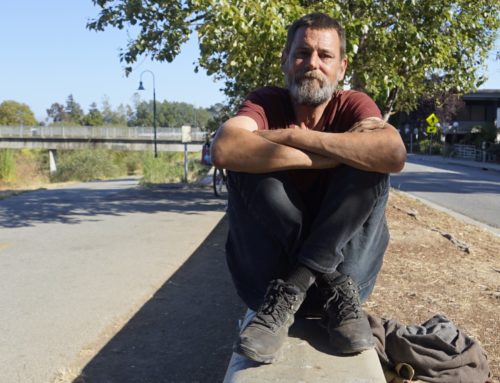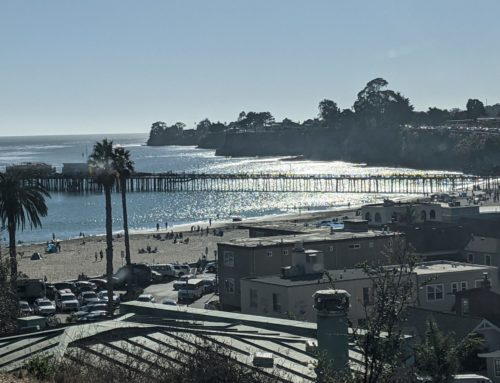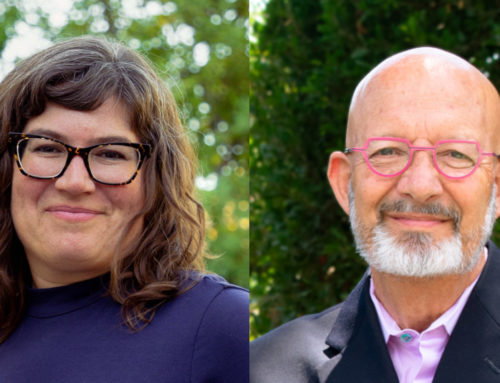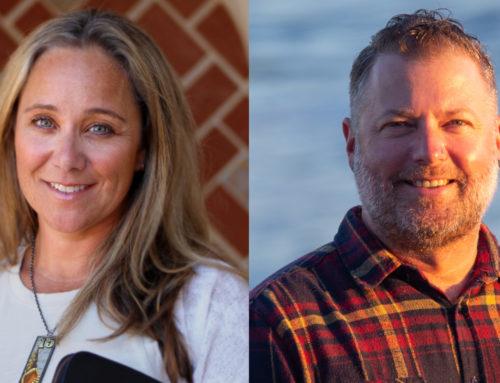Why is Santa Cruz Local a private company? Why did we leave the Sentinel? How are we approaching the City of Santa Cruz HR investigation into two city councilmembers?
Santa Cruz Local co-hosts Kara Meyberg Guzman and Stephen Baxter discuss these questions and more. It’s the second episode of “Meet Santa Cruz Local,” a miniseries giving a behind-the-scenes look at how and why we give you the news.
We share with you our mission and motivation, our decision making and ethics, and our feedback from listeners.
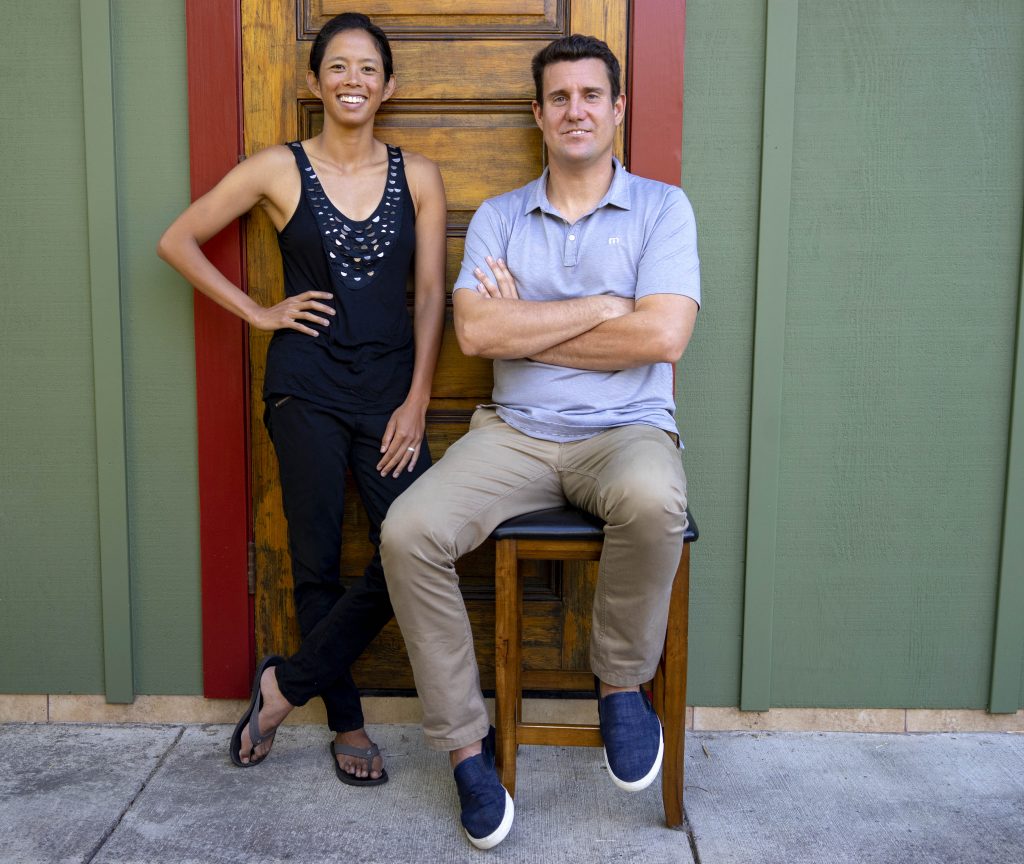
TRANSCRIPT
KARA MEYBERG GUZMAN: This episode is sponsored by Santa Cruz Works. Santa Cruz Works is a local nonprofit building a healthy tech ecosystem. Grow your business, find funding and learn about jobs, news, technologies and events at santacruzworks.org. Santa Cruz Local listeners get a 10 percent discount on Santa Cruz Works memberships. Just use the discount code SANTACRUZLOCAL – that’s all one word, all caps.
[MUSIC]
KARA MEYBERG GUZMAN: Hey everyone. I’m Kara Meyberg Guzman.
STEPHEN BAXTER: And I’m Stephen Baxter.
KMG: We’re the co-hosts of Santa Cruz Local, which is a podcast and website that reports on Santa Cruz’s public institutions. This is part two of a miniseries about us.
[MUSIC]
SB: In part one, we talked about who we are and why we’re doing this. We shared the results of our first listener survey. And we talked with one Santa Cruz Local listener about perceived bias in our reports.
KMG: In today’s episode we’ll talk about transparency, our process and how we make decisions. We’re doing this because we want to earn your trust.
SB: We’re calling this series “Meet Santa Cruz Local.” Because, we think you should know where your news comes from.
[MUSIC FADES OUT]
We wanted to first say thank you to the people who have supported us so far. Some of that has come in the form of letters, and emails and checks — which we really appreciate. And I wanted to just read a couple of these handwritten letters that we’ve received, because they’re awesome.
First: My husband and I really appreciate the work that you guys are doing and would like to offer you this small donation of our support. Thank you for your efforts and keep the flag flying.
That’s from Elizabeth T. and Robert B. of Santa Cruz. All of these are from Santa Cruz.
Another one says: I read your news reports online and listen to you there also. Sometimes even on the radio. Thank you for your thorough coverage of specific issues in Santa Cruz. Michael A.
And yes, we are on the radio. We’re on KSQD 90.7.
And one other quick one: Thank you for providing such a great service to our community. And that one’s unsigned.
Anyway, we just wanted to say thanks.
KMG: Yes, thank you so much to everyone who’s contributed so far. We have about $1,000 so far from about 20 people. And we’re so grateful for that.
Thank you also to everybody who showed up at the podcast meetup. I told you about it in our last episode. It was last Saturday at Abbott Square. I got a lot of valuable feedback about the podcast. We talked about things like bias.
I told them that we are planning to do political endorsements come 2020, when the election rolls around. And they said, “Well, if you’re going to do endorsements, you’re going to have a bias. There’s only two of you. It’s not like you’re going to have an independent editorial board. You might as well own your bias and just say where you’re coming from.”
Say that… label our opinions, but make our opinions be known.
SB: Which also leads us into why we’re an LLC and not a 501c3 nonprofit at this moment. Which is because we do want to do endorsements on ballot measures and everything else.
KMG: Yeah, for those of you who don’t know, 501c3s can’t give political endorsements.
SB: We feel like — I feel like that’s an important thing that newspapers have done, and should continue to do, because they’re out there reporting on all of these people all the time. So they’re in a position to know, maybe more, better than anyone else, about where public policy should go.
KMG: Yeah, I want to be able to say to our listeners, we’ve been neck-deep in this over the last year. We’ve studied the issues and this is what we think.
SB: And one other quick point. I think what we eventually will do with endorsements of ballot measures and candidates is exactly what a newspaper does. You know? They have straight reporting, and they have an editorial page, which is independent of that. So, that’s what we’re trying to do.
And by the way, having participated in a few, you know, editorial board type of stuff, they often ask the reporters, “Well what do you think of this measure that you just did a story on?” You know? And I’m not saying like we have all the answers. I’m just saying that we did a little more research than some other people. And when I vote, I certainly read the editorial pages with a grain of salt.
And I think that’s partly about how you get informed about elections. So, we want to be a part of that.
KMG: So, let’s switch gears and talk about some feedback we got. This week, there was a column in the Good Times, and it was about Santa Cruz Local.
And the columnist was chiding us a little bit about how he thought we weren’t fully transparent in our last “Meet Santa Cruz Local” episode about how you left the Sentinel, Stephen.
So yeah, why don’t we talk about that a little bit.
SB: Well, like I said in the previous episode, I was burned out and I did just have a kid with my wife. But yes, there were some other factors, too.
KMG: Yeah, but before we get into that, I do want to say that our goal with the first episode of “Meet Santa Cruz Local” was to tell you listeners about who we are and why we’re doing this. And we thought that the details of why you and I left the Sentinel, Stephen, were a little bit outside the scope.
But, some of you listeners asked, so here it is.
OK, Stephen, so let’s get into it. Tell our listeners a little more details about why you left the Sentinel.
SB: I left in 2016, which I mentioned before, and I quit. And the reason I quit was because I’d left a nasty voicemail for a source, basically.
And that was my fault, and it was unprofessional. And I regret it.
KMG: So tell our listeners about that voicemail and the circumstances about it.
SB: Sure. It was a year after the 8-year-old Maddy Middleton was murdered at the Tannery in Santa Cruz. I was doing a year-later story and I was trying to reach the mother of the victim who I’d spoken to many times before.
I couldn’t reach her, and I was on deadline, so I rang a friend of hers. And this friend of hers didn’t pick up. And I was frustrated. And I left a voicemail that said that this friend of hers had tried to benefit personally from the murder. And said some things. And I also called her a horrible person, which I regret.
KMG: And was that the case? Was she trying to benefit from the murder?
SB: That was according to people I talked to while reporting the story. And I felt that what she did was wrong and so I said so. And like I said, it was unprofessional.
Kara, let’s switch it to you. A listener also asked for more details on why you left the Sentinel.
KMG: Sure. So, the core of it is that I didn’t feel valued or respected by upper management so I decided to take my skills elsewhere.
[MUSIC BREAK]
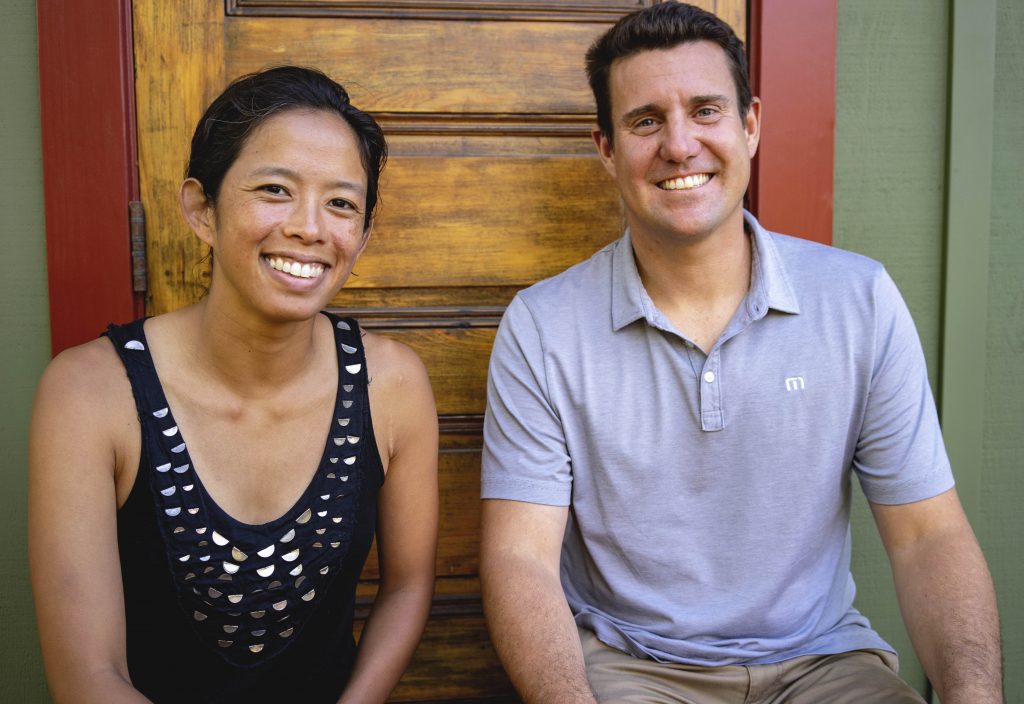
SB: So Kara, I want to ask you about coverage that we’ve done on Santa Cruz City Council members Drew Glover and Chris Krohn. Can you talk about your reporting over the past few weeks? There’s a city HR investigation into possible misconduct, and they’re facing recall campaign.
KMG: Sure. I’ve been following this story since March. That’s when I first heard that an investigation was happening. I submitted my first public records, first of many public records requests back then. But yeah, like we said in the story, we basically got the response that the need for privacy around a sensitive, you know, HR issue, outweighs the public’s need. But yeah, I mean, I didn’t take no for an answer.
Related stories:
Details emerge in investigation of Santa Cruz City Council member (July 31)
Meet Santa Cruz Local, part 1 (July 25)
Report due on councilmembers’ alleged misconduct (July 15)
Councilmembers Glover, Krohn respond to recall campaign (July 10)
Homelessness, council discord, bus passes (Feb. 20)
SB: Yeah, tell them how many times you had to file the public records request.
KMG: Yeah, every day. Every work day pretty much since April I think.
SB: Why every day?
KMG: I got the response that they can’t give me records which don’t yet exist. And, basically, in some of my later requests, I was asking for a copy of the final investigation report, once it’s complete. Because, yeah. So, they, yeah, basically told me, well, it’s not done yet and we can’t make a request for something that’s not done yet, so you’ll just have to come back later.
SB: So, you requested it every single day for, like, weeks?
KMG: Every single day for like weeks, yeah.
SB: [Laughs] That’s cool.
KMG: Yeah, and why? It’s not because I was necessarily hungry for details exposing Chris Krohn and Drew Glover. I’m not out to get anybody.
I just think that this is a big deal that the city is paying for a formal investigation into two of our elected officials. You know, I know it’s a sensitive HR issue. I know there’s a lot of concerns about privacy around that. I understand that.
We’re sensitive to the concerns of the city that if we do this in the wrong way, it may preclude other people from coming forward who have similar concerns. Because they’re … [they’d] be scared of getting outed by the media. And then facing the wrath of Nextdoor.
SB: [Laughs] Nextdoor.
KMG: But yeah. I mean, I think it’s. This is, you know. The city kind of. The city made a judgment call and said that they feel that the need for privacy outweighs the need for the public to know. But, you know, I don’t think that’s the case. I think the public absolutely needs to know the details of a formal misconduct investigation into two councilmembers.
SB: Also, I think it’s worth pointing out that, even if there weren’t a recall going on, that we still would have covered this anyway. Because I think that the, if there’s a beef, maybe they think, oh we really want this recall to happen so we’re just going to cover this HR investigation like crazy in hopes that there’s a recall.
And I can tell you that that’s just not the case. I mean, it’s — I would just like to know what the results of it were. And I think people deserve to know, and that’s that.
KMG: Yeah. To the city’s credit, they have said multiple times that they are planning to release the results of the report once it’s final. And we intend to be there when it happens.
You know, I think if the report finds nothing on Glover and Krohn, people absolutely need to know that. If it does find something, if there are substantiated claims, people absolutely need to know that too.
We should be watching our public officials and they deserve a higher level of scrutiny.
You know, one of the things that we’re watching for is how the city is handling this whole process. One of the things I found interesting is that, Krohn received — in the memo that he got from the HR department — he received a list of the people who complained about him.
I don’t know whether that’s the norm or not, in sensitive HR cases such as these. But, yeah. I think it’s worth looking into.
[MUSIC]
KMG: OK, so I’d like to switch gears here and talk about our business model.
As we’ve told you in this series, come Aug. 19, we’re going to be starting our two-week membership drive. Let me explain to you how it works and why we’re doing it this way.
I should back up by saying that this source of revenue — memberships — is where journalism seems to be trending right now. There’s a lot of energy, and grants and professional development opportunities, training news organizations how to shift more heavily towards a membership model.
Because, as we’ve said, the old business model of news — you know, relying on ads, and to a smaller part, subscriptions — that business model is broken.
[MUSIC]
So, one big perk of memberships is that it’s sustaining. The idea is that you, our listeners, can sign up for either a monthly or annual recurring membership. This gives us a source of predictable revenue where we can plan for the future. If we know how much is gonna be in our bank account each month, it makes it easier for us to grow.
So, the perks of membership — why would you want to be a member? Well, No. 1, we’re assuming that our listeners are doing it mainly because they believe in what we’re doing. They want another fair and accurate local news source. They want to support independent journalism. That’s No. 1.
We’re also offering little perks. You know, to, sort of, sweeten the deal. So things like, we’re gonna be hosting events for example, and members will get discounted tickets.
We have this beautiful new logo that was designed by our graphic artist Haley Williams. It’s handwritten. You might be able to see it on your screen now if you’re listening to us on a podcast app.
And so, members will get stickers with our new logo.
And, things like added reporting. Like, for example, if we were to attend a congresswoman’s town hall, we could post the full audio of the town hall meeting, and make it available to our members.
The one sort of big change that you should know is that our transcripts, which we’ve heard that a lot of you really like, those are going to be available just to our members.
[MUSIC FADES OUT]
So, backing up for a second.
Stephen and I believe that in order to make the biggest impact, our journalism needs to be available to everyone in Santa Cruz County. So, our podcast will always be free to everybody. We really think that’s important.
But, in terms of, how can we give an incentive to people to sign up for a membership and support local journalism? We thought that offering our transcripts to members, that might fit the bill.
[MUSIC]
SB: Before we go, a few more things. We’ve got a listener survey up on our website at santacruzlocal.org. It’s our second one and we’d really like your feedback.
And while you’re there, sign up for our email newsletter, if you haven’t already.
Lastly, save the date: Sept. 18. That’s our official launch party in Cruzio, in downtown Santa Cruz. Details to come on that.
I’m Stephen Baxter.
KMG: And I’m Kara Meyberg Guzman.
SB: Thanks for listening to Santa Cruz Local.
Kara Meyberg Guzman is the CEO and co-founder of Santa Cruz Local. Prior to Santa Cruz Local, she served as the Santa Cruz Sentinel’s managing editor. She has a biology degree from Stanford University and lives in Santa Cruz.
Stephen Baxter is a co-founder and editor of Santa Cruz Local. He covers Santa Cruz County government.



